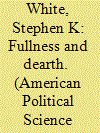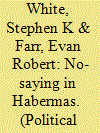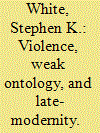| Srl | Item |
| 1 |
ID:
105201


|
|
|
|
|
| Publication |
2010.
|
| Summary/Abstract |
How should inquiry into ethical-political life come to terms with "depth experience?" By this, I mean extraordinary experience that breaks into the familiar frames of meaning and reasoning that undergird everyday life, bringing some sort of transformation or significant solidification of basic commitments or identity. Stated in this abstract fashion, my question is likely to seem rather bewildering or uninteresting for the study of politics. But its potential significance becomes apparent if one mentions George W. Bush and being "born again." This article speculates more broadly about such experience, expanding the focus beyond theists and "limit" experiences. When one does this, depth experience need not be thought of as anathema to political theory. Rather, I show that it can be cultivated in such a way as to animate an admirable "bearing" on the part of citizens of affluent, late-modern societies and cohere with certain fundamentals of deliberative democracy.
|
|
|
|
|
|
|
|
|
|
|
|
|
|
|
|
| 2 |
ID:
109940


|
|
|
|
|
| Publication |
2012.
|
| Summary/Abstract |
Habermas's paradigm of communicative action is usually taken to be pretty much dominated by consensus, "Yes-saying." What if this were a radically one-sided perception? We take up this unorthodox position by arguing that "no-saying" in this paradigm is typically overlooked and underemphasized. To demonstrate this, we consider how negativity is figured at the most basic onto-ethical level in communicative action, as well as expressed in civil disobedience, a phenomenon to which Habermas assigns the remarkable role of "touchstone" (Prufstein) of constitutional democracy. Once the importance of no-saying is drawn out, the paradigm looks distinctly less hostile to dissensus and agonism in democratic life.
|
|
|
|
|
|
|
|
|
|
|
|
|
|
|
|
| 3 |
ID:
092142


|
|
|
|
|
| Publication |
2009.
|
| Summary/Abstract |
This essay responds to the characterization Ted Miller offers (in his December 2008 essay in Political Theory) of the kind of nonfoundationalism I have referred to as "weak ontology," and that Gianni Vattimo frequently calls "weak thought." Miller argues that such a position embodies, first, a philosophy of history in which strong ontologies (e.g., religion) are assessed categorically as passé, and, second, are associated essentially with violence. I show that while these characterizations may be appropriate for Vattimo's thought, they are not for weak ontology as I understand it. Finally, I suggest that the former might more usefully be categorized as "antifoundationalism" and the latter as "nonfoundationalism."
|
|
|
|
|
|
|
|
|
|
|
|
|
|
|
|